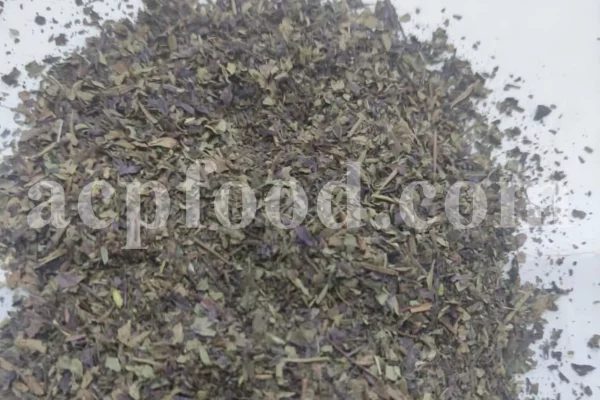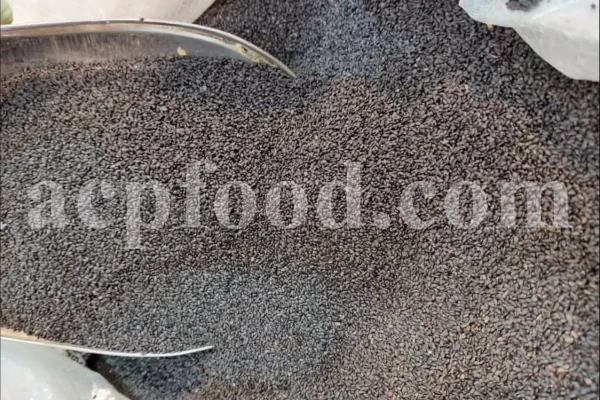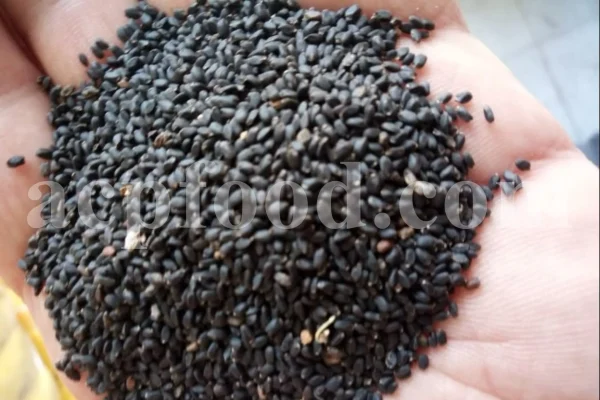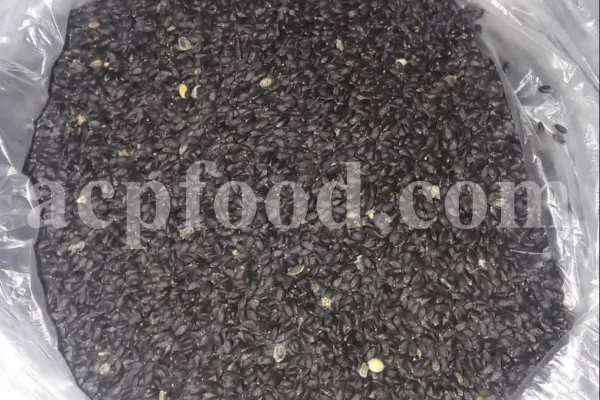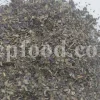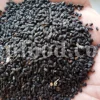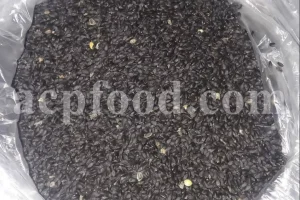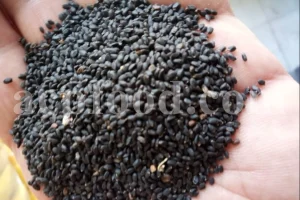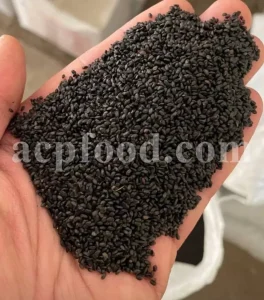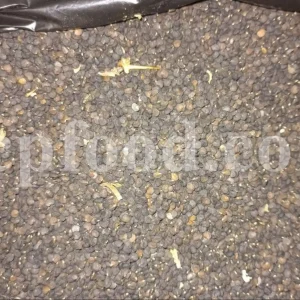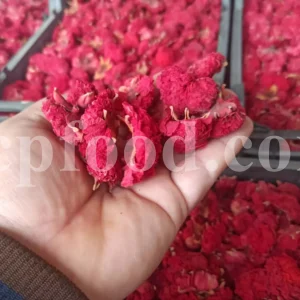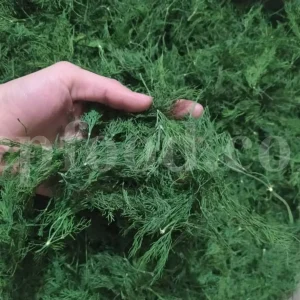GENERAL DATA
Plant parts: Seed, Leaf
Cultivation mode: Wild Collection\Cultivated
In manufacturing: Beverages, pharmaceutical.
In food: It can stabilize ice cream. It can also be used to stabilize salad dressing, jellies, low-fat whipped cream, and serve as a fat replacement in yogurt and mayonnaise. You can also use basil seeds at home to thicken soups, sauces, and desserts. It is used in making bread.
🌱 Industries That Use Basil Seeds (Ocimum basilicum L.)
Basil Seeds, also known as Sabja Seeds, Tukmaria, or Falooda Seeds, are the black, tear-shaped seeds of Ocimum basilicum L.—a well-known aromatic plant widely cultivated in Asia, Africa, and Europe. Though commonly confused with chia seeds, basil seeds have unique hydrogel-forming, cooling, and mucilaginous properties, making them valuable across food, health, cosmetic, and pharmaceutical industries.
🌿 What Are Basil Seeds?
Basil seeds are the dried seeds of the sweet basil plant, containing a high amount of soluble fiber, mucilage, polyphenols, and essential fatty acids. When soaked in water, they form a gelatinous outer layer, making them ideal for cooling drinks, textural modifiers, and natural gut health products.
They are caffeine-free, gluten-free, and considered functional superfoods, especially in Asian, Ayurvedic, and Middle Eastern markets.
1. Food & Beverage Industry
Basil seeds are increasingly used in functional beverages, desserts, and health-oriented foods due to their high fiber content and appealing texture when soaked.
Applications:
-
Soaked seeds in drinks like falooda, milkshakes, lemonade, and herbal tonics
-
Added to yogurt, smoothies, and chia-style puddings
-
Used in dessert gels, ice creams, and fruit cups
-
Gluten-free and fiber-enriched baked goods
✅ Popular in vegan, detox, plant-based, and low-calorie product lines
✅ Label-friendly: “natural fiber,” “no added sugar,” “hydrocolloid source”
2. Nutraceutical & Functional Supplement Industry
Rich in mucilage and alpha-linolenic acid (ALA), basil seeds support gut health, satiety, weight management, and mild laxative effects.
Applications:
-
Natural appetite suppressants and detox blends
-
Fiber-rich prebiotic supplements for digestion
-
Omega-3–based formulations for vegan nutrition
-
Satiety enhancers in weight loss capsules or powders
✅ Suitable for keto, intermittent fasting, and Ayurvedic detox regimes
✅ Emerging ingredient in gut biome research
3. Pharmaceutical & Medical Nutrition
Basil seeds are used in traditional and integrative medicine for their anti-inflammatory, antioxidant, cooling, and laxative effects.
Medical Uses:
-
Herbal laxatives for constipation and IBS
-
Cooling formulations for heatstroke or acidity
-
Cough syrups (mucilage soothes throat)
-
Diuretic and anti-ulcer herbal blends
✅ Safe for long-term use; no major contraindications
✅ Recognized in Ayurveda, Unani, and Persian medicine
4. Cosmetic & Skincare Industry
The hydrating and antioxidant properties of basil seed mucilage make it useful in natural cosmetics, especially for soothing, cooling, and hydrating formulations.
Applications:
-
Hydrating facial masks and gels
-
Soothing skin creams for sunburns or irritation
-
Natural exfoliating scrubs using hydrated seeds
-
Scalp-soothing shampoos with anti-inflammatory extracts
✅ Often used in Ayurvedic and herbal skincare
✅ High in flavonoids and polyphenols beneficial for skin
5. Weight Management & Slimming Products
The swelling capacity of basil seeds (up to 20–30x their dry volume) provides natural satiety, making them widely used in slimming drinks, detox plans, and meal replacements.
Applications:
-
Appetite-control beverages and satiety shakes
-
Added to meal replacement formulas
-
Gut-cleansing detox kits
✅ Combines with lemon, apple cider vinegar, and herbal teas
✅ Natural alternative to synthetic appetite suppressants
6. Ethnic & Traditional Product Markets
Basil seeds are deeply rooted in South Asian, Middle Eastern, and Southeast Asian cultures—especially in summer beverages and festive sweets.
Popular Uses:
-
Falooda (India/Iran), Thai basil drinks, Rose-milk sherbets
-
Ramadan beverages (combined with rosewater, milk, or lemon)
-
Traditional Persian syrup-based tonics (Sharbat-e Tokhm-e Reihan)
✅ Popular during hot seasons for natural cooling effects
✅ Increasingly available in ready-to-drink global markets
7. Academic & Botanical Research
Basil seeds are being studied for their gel-forming polysaccharides, antioxidant potential, and blood sugar regulation effects.
Research Focus:
-
Glycemic index and blood glucose moderation
-
Antioxidant and anti-ulcer activities
-
Mucilage composition and hydrogel behavior
-
Use in pharmaceutical-grade emulsions and suspensions
✅ Used in drug delivery systems and food rheology research
✅ Studied for applications in biodegradable packaging
✅ Summary of Key Applications
| Industry | Common Uses |
|---|---|
| Food & Beverage | Falooda, smoothies, detox drinks, puddings |
| Nutraceutical & Health | Digestive support, omega-3 supplements, detox blends |
| Pharmaceutical | Laxatives, cooling tonics, mucilage syrups |
| Cosmetic & Personal Care | Hydrating gels, soothing creams, antioxidant skincare |
| Weight Management | Appetite control drinks, satiety boosters, meal replacers |
| Ethnic & Traditional | Ramadan drinks, Persian sharbat, Indian sweets |
| Academic & Research | Mucilage studies, glycemic control, antioxidant compounds |
🌟 Key Features
-
Rich in soluble fiber, ALA (omega-3), and polyphenols
-
Forms a natural hydrogel when soaked, ideal for hydration and gut health
-
Caffeine-free, gluten-free, and vegan-friendly
-
Used in traditional medicine for cooling, digestive, and laxative purposes
-
Growing presence in functional beverages, detox plans, and superfood markets
🌱 Industries That Use Ocimum album Basil Seeds (Tokhme Sharbati)
Tokhme Sharbati refers to the tiny black seeds of Ocimum album L., a close relative of Ocimum basilicum but botanically distinct. These seeds are smaller, milder in aroma, and gel more quickly than common basil seeds. Traditionally consumed in Iran, Afghanistan, India, and Arab countries, Tokhme Sharbati is a staple in herbal tonics, summer drinks, and traditional cooling remedies.
🌿 What Are Ocimum album Basil Seeds?
Ocimum album seeds are rich in mucilage, soluble fiber, polyphenols, and phytosterols. When soaked in water, they form a soft, slippery gel that is used for cooling, digestive relief, and appetite control. Unlike chia seeds, they do not need hours to hydrate—5–10 minutes is enough.
They are widely used in Persian Sharbat, Ayurvedic beverages, and functional herbal drinks, especially during hot seasons and Ramadan.
1. Food & Beverage Industry
Tokhme Sharbati is a key ingredient in cooling summer drinks, herbal tonics, and functional food recipes, especially across the Middle East and Asia.
Applications:
-
Main ingredient in Persian Sharbat-e Tokhme Sharbati (with lemon and rosewater)
-
Added to herbal drinks, smoothies, and detox shots
-
Thickening and gelling agent in health desserts
-
Functional ingredient in flavored waters and RTD beverages
✅ Used in halal, vegan, and plant-based product lines
✅ Adds visual appeal and fiber content to beverages
2. Nutraceutical & Wellness Supplement Industry
Due to its high soluble fiber and mucilage, Tokhme Sharbati supports gut health, detox, and blood sugar balance.
Applications:
-
Digestive fiber in gut microbiome products
-
Vegan omega-rich detox blends (contains alpha-linolenic acid)
-
Appetite-reducing shakes and satiety supplements
-
Herbal support for sugar control and mild constipation
✅ Traditional cleansing agent in Persian medicine
✅ Ideal for weight management, fasting, and intermittent detox diets
3. Pharmaceutical & Herbal Medicine
In Unani, Persian, and Ayurvedic traditions, Tokhme Sharbati is used to relieve internal heat, soothe inflammation, and balance digestion.
Medical Uses:
-
Herbal laxatives and cooling syrups
-
Mucilage-based soothers for coughs and sore throat
-
Mild diuretics and detox aids
-
Used for heartburn, bloating, and intestinal cleansing
✅ Classified as safe, non-irritating, and gentle on the stomach
✅ Frequently combined with lemon, mint, or rosewater extracts
4. Cosmetic & Personal Care Industry
Hydrated basil seeds from Ocimum album are high in hydrating gel mucilage, making them suitable for natural skincare and cooling treatments.
Applications:
-
Cooling face masks and gels for sunburn or irritation
-
Natural scalp soothers and hair conditioners
-
Herbal foot soaks and moisturizing masks
-
Skin-nourishing emulsions (DIY and organic skincare lines)
✅ Popular in traditional Persian and Ayurvedic beauty rituals
✅ Used for anti-itch and inflammation-relief topicals
5. Ethnic, Cultural & Traditional Use Markets
Tokhme Sharbati is a cultural staple in Iran, Afghanistan, and neighboring regions, especially during Ramadan, Nowruz, and hot months.
Uses:
-
Sharbat with lemon, sugar, Rosewater, and Saffron
-
Sold as a key ingredient in herbal cooling powders
-
Common in religious fast-breaking (Iftar) and traditional ceremonies
✅ Natural and caffeine-free energy refresher
✅ Long shelf life; easy to hydrate and serve
6. Academic, Nutritional & Food Science Research
Ocimum album seeds are under study for their mucilage properties, blood sugar modulation, and potential as a natural food hydrocolloid.
Research Areas:
-
Glycemic index studies (slows glucose absorption)
-
Use in diabetic-friendly food formulations
-
Emulsification and viscosity-control in food tech
-
Phytochemical analysis (flavonoids, ALA, mucilage)
✅ Studied for food texture applications and natural emulsifiers
✅ Potential in functional packaging and slow-release drugs
✅ Summary of Key Applications
| Industry | Common Uses |
|---|---|
| Food & Beverage | Sharbat, detox drinks, smoothies, vegan desserts |
| Nutraceutical & Health | Fiber supplements, detox blends, appetite control |
| Pharmaceutical | Cooling tonics, mucilage syrups, digestive aids |
| Cosmetic & Personal Care | Soothing masks, scalp creams, hydrating gels |
| Ethnic & Traditional | Ramadan and Nowruz beverages, Persian Sharbat |
| Academic & Research | Glycemic studies, mucilage analysis, emulsification research |
🌟 Key Features
-
Smaller and faster-gelling than common basil seeds (O. basilicum)
-
High in mucilage, fiber, and ALA (omega-3)
-
Caffeine-free, non-allergenic, and suitable for children and elders
-
Rich tradition in Persian medicine, Ramadan fasting, and cooling tonics
-
Used across functional beverages, natural laxatives, and herbal skincare
🍃 Industries That Use Basil Leaves (Ocimum basilicum L.)
Ocimum basilicum L., commonly known as Sweet Basil, is a culinary and medicinal herb prized for its aromatic essential oils, bioactive flavonoids, and antibacterial properties. Native to tropical Asia and widely cultivated across the world, Basil is integral to food, herbal, pharmaceutical, and cosmetic industries.
Basil leaves are harvested fresh or dried and are used in the form of whole leaves, powders, extracts, and essential oils.
🌿 What Are Basil Leaves?
Basil leaves are rich in linalool, eugenol, methyl chavicol, and rosmarinic acid. These volatile and phenolic compounds contribute to basil’s therapeutic effects including antioxidant, anti-inflammatory, and antimicrobial properties.
1. Food & Culinary Industry
Basil is a staple in global cuisine, especially Italian, Mediterranean, Persian, Thai, and Indian dishes.
Applications:
-
Fresh or dried herb in pasta, pizza, soups, sauces, and curries
-
Ingredient in pesto, spice blends, and flavored oils
-
Basil-infused vinegars and salad dressings
-
Used in herbal teas and refreshing beverages
✅ Widely used in clean-label, vegan, and organic products
✅ Valued for both aroma and digestive aid in foods
2. Nutraceutical & Wellness Supplement Industry
Due to its polyphenols and essential oils, basil leaves support detox, immune health, and mental clarity.
Applications:
-
Basil leaf powders in green supplements and capsules
-
Detox teas and liver support blends
-
Antioxidant shots and stress-reducing tonics
-
Herbal tablets for blood sugar support
✅ Used in traditional Persian, Ayurvedic, and Siddha systems
✅ Marketed for calming, cleansing, and adaptogenic properties
3. Pharmaceutical & Herbal Medicine
Basil leaves are employed in natural medicine for their digestive, antimicrobial, and anti-inflammatory properties.
Medical Uses:
-
Used to treat gas, bloating, and indigestion
-
Antimicrobial agent in throat sprays and lozenges
-
Adjunct in herbal formulas for respiratory and liver conditions
-
Natural remedy for headaches and mild fevers
✅ Considered safe and gentle for daily use
✅ Recognized in multiple pharmacopeias and herbal codices
4. Cosmetic & Personal Care Industry
Basil extracts and essential oils are valued in skincare and haircare for their cleansing, refreshing, and antioxidant properties.
Applications:
-
Purifying facial toners and anti-acne formulas
-
Scalp serums and dandruff shampoos
-
Basil leaf water in body sprays and facial mists
-
Used in aromatherapy for mental clarity and alertness
✅ Antibacterial and sebum-regulating in oily skin care
✅ Supports scalp balance and hair strengthening
5. Essential Oil & Aromatherapy Industry
Sweet basil essential oil is high in linalool and eugenol, giving it a sweet, herbaceous, slightly spicy aroma.
Applications:
-
Used in diffusers for mood elevation and stress relief
-
Inhalation blends for respiratory clarity and focus
-
Natural mosquito repellents and air fresheners
-
Ingredient in massage oils for muscle relaxation
✅ Popular in perfumery and therapeutic blends
✅ Used in traditional medicine for mental clarity and uplift
6. Ethnic, Organic & Traditional Medicine Markets
Basil holds sacred and therapeutic status in many cultures, especially in Persian, Indian (Tulsi’s cousin), and Thai traditions.
Applications:
-
Featured in Nowruz and Ramadan dishes
-
Used in folk teas and healing soups
-
Associated with protective and purifying rituals
-
Incorporated in natural remedies for anxiety and digestion
✅ Widely accepted in traditional medical systems
✅ Easily dried, extracted, and exported
7. Academic & Phytochemical Research
Research focuses on basil’s essential oils, phenolic content, and bioactive mechanisms in immunity and inflammation.
Research Areas:
-
Antimicrobial and anti-inflammatory compound isolation
-
Blood sugar modulation and liver protective effects
-
Basil oil as a natural food preservative
-
Studies on cognitive and neuroprotective potential
✅ Botanically versatile: fresh leaves, extracts, oils
✅ Ongoing studies on standardization for pharmaceutical use
✅ Summary of Key Applications
| Industry | Common Uses |
|---|---|
| Food & Culinary | Pesto, sauces, spice blends, teas, flavor oils |
| Nutraceutical & Wellness | Detox teas, antioxidant shots, capsules |
| Pharmaceutical | Digestive tonics, antimicrobial lozenges, adaptogen blends |
| Cosmetic & Personal Care | Acne toners, scalp serums, facial sprays |
| Essential Oil & Aroma | Diffusers, stress-relief blends, air fresheners |
| Ethnic & Traditional Use | Folk remedies, sacred use, celebratory cuisine |
| Academic & Research | Antimicrobial, anti-inflammatory, neuroprotective studies |
🌟 Key Features
-
Rich in linalool, eugenol, and rosmarinic acid
-
Antimicrobial, digestive, and stress-relieving effects
-
Used fresh, dried, or as essential oil
-
Integral to culinary, herbal, and therapeutic traditions
-
Widely researched and exported for functional food, skincare, and wellness markets
🌿 Comparison Table: Basil Plant Derivatives
| Feature / Aspect | 🌱 Basil Seed (Ocimum basilicum L.) | 🌱 Basil Seed (Ocimum album L.) (Tokhme Sharbati) | 🍃 Basil Leaf (Ocimum basilicum L.) |
|---|---|---|---|
| Botanical Source | Ocimum basilicum L. (Sweet Basil) | Ocimum album L. (White Basil / Persian Sharbati Basil) | Ocimum basilicum L. (Sweet Basil) |
| Part Used | Seed | Seed | Leaf (fresh or dried) |
| Seed Size & Appearance | Slightly larger, oval, black to dark brown | Smaller, fine, jet black, rounder | N/A |
| Persian Name | تخم ریحان (Tokhme Reyhan) | تخم شربتی (Tokhme Sharbati) | برگ ریحان (Barg-e Reyhan) |
| Primary Industry Uses | Food, Beverage, Nutraceutical, Cosmetic | Food, Beverage, Nutraceutical, Hydration blends | Culinary, Nutraceutical, Cosmetic, Essential Oils |
| Main Functional Uses | Cooling drink thickener, digestive aid | Cooling drinks (Sharbat), blood sugar control, satiety | Culinary herb, antioxidant, antimicrobial |
| Hydration Property | High water absorption, forms gel layer | Very fast hydration, smooth texture when soaked | N/A |
| Rich in | Mucilage (soluble fiber), polyphenols | Mucilage, flavonoids, omega-3s (ALA) | Essential oils (linalool, eugenol), polyphenols |
| Health Benefits | Digestive support, blood sugar control | Cooling, digestion, hydration, minor laxative effect | Anti-inflammatory, antimicrobial, stress relief |
| Culinary Applications | Beverages, smoothies, puddings, desserts | Persian drinks (Sharbat), detox mixes, satiety drinks | Pesto, soups, salads, sauces, herbal teas |
| Cosmetic Uses | Gel masks, soothing serums | Cooling skin treatments, masks | Facial toners, anti-acne products, scalp tonics |
| Common Market Form | Whole dry seeds | Whole dry seeds | Fresh, dried, powdered, or essential oil |
| Export Popularity | Popular in Asia, Middle East, wellness sector | Very popular in Iran, India, health & detox drink markets | Globally used herb (culinary and natural health) |
| Cultural Importance | Ayurvedic and Unani medicine, used in Ramadan | Highly favored in Persian summer drinks and rituals | Sacred and culinary herb in many traditions |
🧠 Summary Highlights
-
Basil Seeds (O. basilicum) → Larger seeds, used in functional drinks and digestion support.
-
Sharbati Seeds (O. album) → Smaller, faster-absorbing, essential in Persian “Sharbat”, known for cooling effects.
-
Basil Leaves (O. basilicum) → Aromatic herb used in cuisine, herbal medicine, and cosmetics.
PRODUCT NAME IN DIFFERENT LANGUAGES
Persian Name: تخم ریحان، تخم شربتی/ Tokhme Reyhan, Tokhme Sharbati
German Name (Deutschland, Austria, Switzerland): Basilikum samen
French Name (France, Belgium, Switzerland, Quebec): graine de Basilic
HARVEST CALENDAR
Feb
Mar
Apr
May
Jun
Jul
Aug
Sep
Oct
Nov
Dec
To order Holy Basil seeds, please contact us.
To order Sabja seeds, please contact us.
To order Tukmaria seeds, please contact us.


